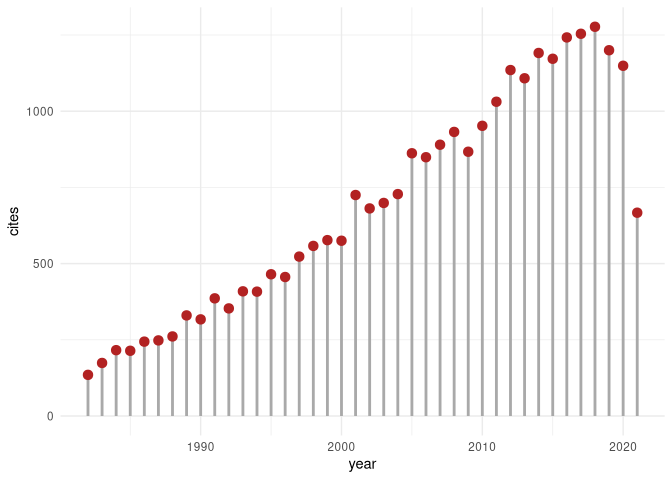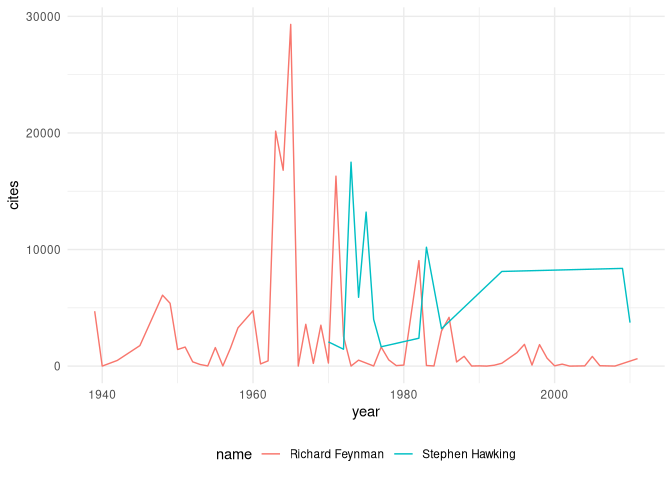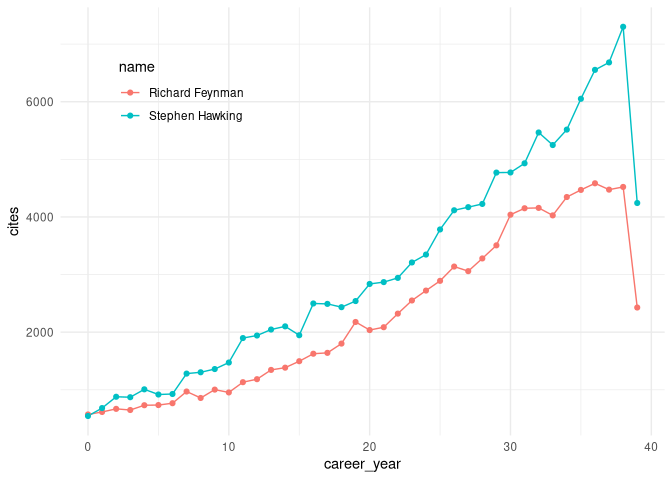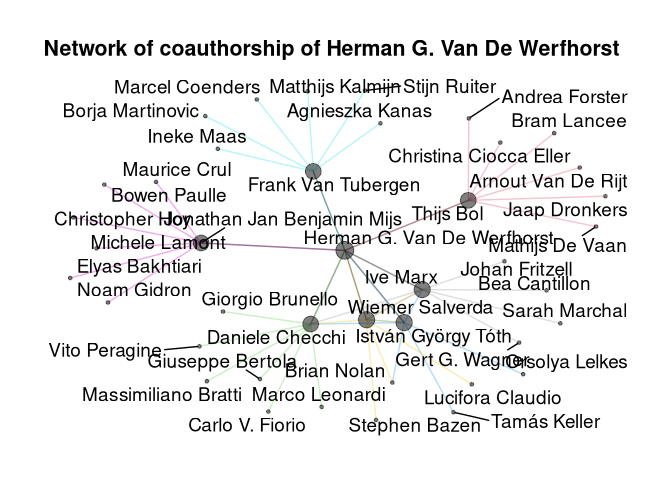preface
I was working on my resume recently and happened to see this bag, scholar.
I just got [[27 - get my Google academic ID]] to experience it.
scholar
This package requires a ladder to access Google. For setting up agents, you can refer to [[73-R tool guide 20 - setting up agents gracefully in R]]. If you really don't have a ladder, you can also refer to my introduction to tinyscholar below.
Once you get your Google id, you can operate:
library(scholar) ## Define the id for Richard Feynman id <- 'B7vSqZsAAAAJ' ## Get his profile l <- get_profile(id)
Then you will return to a list containing all your information above:
> l $id [1] "B7vSqZsAAAAJ" $name [1] "" $affiliation [1] "" $total_cites $h_index $i10_index $fields [1] "" $coauthors [1] "Sort by citations" "Sort by year" "Sort by title"
get_publications() return a data.frame returns all the article information of the author:
> get_publications(id)
## title
## 1 Quantum mechanics and path integration
## 2 The Feynman lectures on physics
## 3 TheFeynman lectures on physics
## author
## 1 RP Feynman, AR Hibbs
## 2 RP Feynman, RB Leighton, M Sands, SB Treiman
## 3 RP Feynman, RB Leighton, M Sands, CA Heras, R Gómez, E Oelker, ...
## journal number cites year
## 1 McGraw–Hill 29222 1965
## 2 Physics Today 17, 45 16564 1964
## 3 Fondo Educativo Interamericano, cop. 16288 1971
## cid
## 1 14769952204323476283,12549707430555464374,17914366645132260192
## 2 14769952204323476283,15649786516955137750,9018562047232646150,13112633961799421939,3669163321259408309
## 3 14769952204323476283,14916754439012518946,10013291528877493387,1429512600027192349,44985079034195671,788740732818767427,2968587135607687418,4222687201833278212,12056396428888674710,2448266002953084807
## pubid
## 1 hMod-77fHWUC
## 2 u-x6o8ySG0sC
## 3 SP6oXDckpogC
title
There are other functions:
- get_citation_history returns the citation information of the author's year
- get_article_cite_history returns the citation information of the article year
for instance:
## Get article citation history
ach <- get_article_cite_history(id, p$pubid[1])
## Plot citation trend
ggplot(ach, aes(year, cites)) +
geom_segment(aes(xend = year, yend = 0), size=1, color='darkgrey') +
geom_point(size=3, color='firebrick')

Compare with your peers?
compare_scholars:

compare_ scholar_ Career cumulative ratio:

coauthor_network <- get_coauthors('amYIKXQAAAAJ&hl', n_coauthors = 7)
plot_coauthors(coauthor_network)
You can also compare the author's good friends and the good friends of good friends:

tinyscholar
According to the author:
★ through searching, I found that someone provided an access interface written in php, which can return a section of Google academic data in json format according to Google academic id, including references and publications. Although the data is simple, it is enough for my use. I further found the address of the corresponding GitHub project [3]. After communicating with the sword edge of Openbiox, I also deployed the same interface on Hiplot project [4] for easy calling. "
Therefore, this method does not need a ladder:
# install.packages("devtools")
devtools::install_github("ShixiangWang/tinyscholar")
# devtools::install_git("https://gitee.com/ShixiangWang/tinyscholar")
library(tinyscholar)
tinyscholar(id)
$publications
$citations
when count
1 total 3
attr(,"class")
[1] "ScholarProfile" "list"
Just no H_ I've got more information.
Later words
This Google academic still has a disadvantage. It can't automatically capture author information.
I just wanted to see two teachers pk, but they didn't register.
reference material
[1]
"R < - package" uses tinyschorar to display personal Google academic archives - Jianshu (jianshu.com): https://www.jianshu.com/p/86eb8a6532e6
[2]
scholar: Analyse citation data from Google Scholar (r-project.org): https://cran.r-project.org/web/packages/scholar/vignettes/scholar.html
[3]
GitHub project: https://links.jianshu.com/go?to=https%3A%2F%2Fgithub.com%2Ffredrike%2Fgooglescholar-api%2F
[4]
Hiplot project: https://links.jianshu.com/go?to=https%3A%2F%2Fhiplot.com.cn%2F